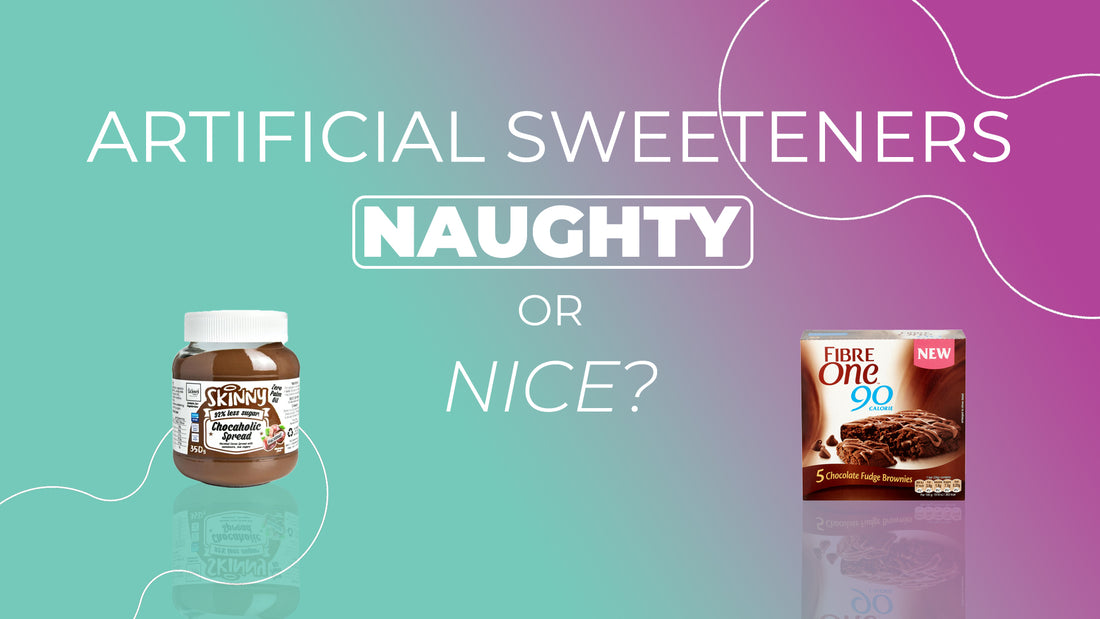
Okay, we get it, you’ve got a sweet tooth (scientists say there's no such thing!)
Mid afternoon hits and your brain is telling you you need your next fix, but what if we told you that your brain isn't actually craving sugar?
See, your brain isn't able to differentiate flavours. What it does crave is readily available calories, which you'll find in sugary or sweet foods. These foods provide a quick burst of energy, so it doesn't take much to convince the brain to say yes to them.
What’s more, giving in to our undeniable ‘sweet tooth’ may be to blame for our poor gut health. Read on to find out how seemingly ‘healthy’ zero-calorie options could be hurting more than helping, and what to do about it.
What are Artificial Sweeteners?
Artificial sweeteners are synthetic substances made to mimic sugar. Zero calories and much sweeter than real sugar, they’re often used in all those great tasting low-carb, low-cal, low-fat sweet treats. Sounds great right? A sweeter taste and no calorific value, you’d think this means you could crack on and enjoy the stuff without a care in the world. Well, think again.
These are the Artificial Sweeteners approved for use in the UK:
-
Acesulfame K
-
Aspartame
-
Saccharin
-
Sorbitol
-
Sucralose
-
Xylitol
A third of all soft drinks in the UK contain these chemicals, but they can be found everywhere: from toothpaste and chewing gum to ready meals, baked goods, dairy products, even some vitamins!
Why Are Artificial Sweeteners Bad for You?
Because of the extensive processes used to make these sweeteners, they’re often much sweeter than natural sweeteners. Saccharin is 200-700 sweeter than table sugar! This makes them so much harder for the human body to break down and has the potential to change our tolerance for sweetness.
| Artificial Sweetener | Sweetness compared to Table Sugar |
| Acesulfame K* | 200x more |
| Aspartame* | 200x more |
| Saccharin | up to 700x more |
| Sorbitol | up to 70% as sweet |
| Sucralose* | up to 700x more |
| Xylitol | Equal sweetness |
*the most common artificial sweeteners in the UK
What are the side effects?
There are 3 main negative side effects of excessive consumption of these chemicals.
1. Mood Swings and Dependencies
When we eat something sweet, an enormous amount of the happy hormone dopamine is released by our brain. This is similar to what happens when we ingest drugs and alcohol! And really, can be just as addictive. The more sweet stuff we give our bodies, the more we crave it and thus a vicious cycle begins.

2. Damage of the Gut & it's microbiome
Artificial sweeteners contribute to the state of our gut health – which is constantly changing and made up of trillions of bacteria. It’s well established that food influences gut health.
The artificial sweeteners in foods are not absorbed by the small intestine so travel all the way to our colon, interacting with the entire ecosystem of our digestive tract. Not good!
Evidence is surfacing that suggests these “magic” sweeteners that leave no trace can do dangerous damage to the gut microbiome, in animals and humans. Even when given daily amounts deemed safe by the FSA, participants showed a weakened tolerance to glucose.
3. Contribute to Insulin Resistance
Consumption of artificial sweeteners results in higher insulin resistance (when cells within your muscles, fat and liver stop responding to insulin and are no longer able to use glucose from your blood for energy, this triggers the pancreas to make more insulin and over time blood sugar levels increase) in humans.
When glucose levels are too high for too long, our risk of heart disease increases, as well as the chance of developing type 2 diabetes. All of these are lifestyle diseases we can help control everyday.
What Sugar Alternatives are Safe to Consume?
There are plenty of natural sweeteners which can serve as a substitute to the typical table sugar. Check out this instagram post where we talk about the best ones and how to use them!
An important thing to remember is that all natural sweeteners still behave like sugar in the body. Meaning they can contribute to weight gain and blood sugar spikes when eaten in excess. The NHS recommends no more than 30g of free sugars a day.
Final Thoughts
Now, no one is telling you to stop eating or drinking your favourite sugar-free treats, but next time you have a craving, think about the harm you could be doing to your gut microbiome over time.
Instead of reaching for that cold can of sugar-free Coke, think about a can of Dash flavoured water instead. Their flavours are delicious and your gut bugs will thank you ;)
Got some sugar-free top tips you want to share? Send them to sunnavankampen@tonichealth.co and chat with our Tonic Founder!








